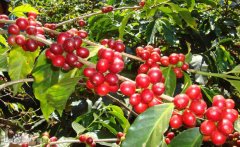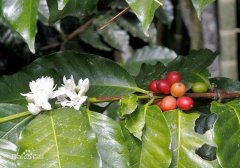Kenya Coffee Bean Flavor Kenya Coffee Bean Origin Fine Coffee
Kenya is bordered to the north by Ethiopia, the origin of Arabica coffee trees, but it was not until the beginning of the 20th century that coffee cultivation began. In the 19th century, missionaries introduced Arabica trees from the leaves, but did not plant them in large quantities. It was not until 1893 that coffee was cultivated on a large scale due to the introduction of Brazil's ancient bourbon seeds. In other words, Kenyan coffee was of Brazilian origin, due to changes in water, climate and handling methods. The flavor of Kenyan beans is very different from that of Brazilian beans. Brazilian coffee is planted at a low altitude, with soft texture and no obvious sour taste. In contrast, Kenyan coffee trees are mainly concentrated on the slopes near Mount Kenya, about 4 to 6500 feet above sea level, which is suitable for coffee beans to develop their flavor, because the mountain temperature is lower and the growth is slower, and the aromatic components of coffee beans are fully developed. the acidity of the fruit is more obvious and the texture is harder. In addition, Kenya was an early British colony, and the British had established a set of perfect cultivation and quality control system. After Kenya became independent, the coffee industry was built on its existing foundation.
There are two types of coffee farms in Kenya. One is a large plantation that covers an area of more than five acres, but the average elevation is low. In the case of Kenyan coffee, the coffee beans of the large farms are of medium quality. The best Kenyan beans come from small farms, most of which are located in the foothills or volcanic slopes above 5,000 to 6,000 feet. Each small farmer has a capacity of only 20 to 70 bags per season and cannot afford to invest in expensive washing plants, but small farmers are very United. Hundreds or thousands of households are gathered to set up a cooperative farm, which is funded by the government to build a washing treatment plant, and the coffee fruits picked by small farmers are sent to the cooperative farm for unified processing. First remove the half-ripe or rotten fruit, then peel, ferment, decompose the flesh, remove the coffee beans, then dry and polish, the whole process is supervised by the official Coffee Administration, which ensures the quality of Kenyan coffee. Kenya bean washing processing technology and high standards of quality control, has always been an example of bean-producing countries.
Kenyan coffee fruit
Don't underestimate the small farmers in Kenya, they are just like ants, and their overall production capacity is higher than that of large farms, about six to four, which is quite rare in bean-producing countries. Kenyan coffee is widely appreciated by connoisseurs, thanks in large part to small farmers guarding the foothills and producing high-quality coffee. In addition, Kenya beans must have a strict grading system. Coffee beans taken out by washing plants are divided into five grades according to size, shape and hardness, with the highest being PB, followed by AA++, AA+, AA and AB. This grading system is similar to Colombia, mainly in terms of particle size and shape, but selling well does not necessarily lead to good flavor. This is what coffee fans should know. The current international evaluation of Kenyan beans is not as good as in previous years. It is believed that this has something to do with the abnormal climate, which is not conducive to the growth of coffee, but the matter is not so simple. This is related to the Kenyan authorities' efforts to promote the new variety Ruiru11 with stronger disease resistance and higher yield per unit. According to the taste test, the new variety with higher economic value has a worse flavor than the traditional variety, and to make matters worse, Ruiru11 is about to replace the traditional Arabica and Bourbon varieties. In addition, the quality of coffee is declining, the auction price is not good, and the income of small farmers is reduced. Coupled with the fact that the coffee management bureau is not a paradox, farmers' enthusiasm for coffee will be greatly reduced, which will of course affect the quality of coffee. Moreover, Kenya's outstanding washing technology has also declined, which is the killer of strangling quality.
In addition, Kenya was an early British colony, and the British had established a perfect cultivation and quality control system. After the independence of Kenya, the coffee industry has made great strides on the existing basis, and has become a foreign exchange earning industry in Kenya.

Important Notice :
前街咖啡 FrontStreet Coffee has moved to new addredd:
FrontStreet Coffee Address: 315,Donghua East Road,GuangZhou
Tel:020 38364473
- Prev

Guadeloupe used to be the best coffee producer and used to be a coffee mecca.
Good coffee production has been affected by natural disasters this group of islands in the Caribbean used to be an important producer of coffee. In 1789, more than 1 million coffee trees on 500 hectares of land produced 4000 tons. Today, only 150 hectares of land is used to grow coffee. This decline can be attributed to the increase in sugar cane and banana production and Hurricane HurricaneInes in 1996.
- Next

Guatemala coffee once enjoyed a reputation as the best quality coffee in the world
Antigua is also a famous coffee producer. Antigua coffee is produced at Hacienda Carmona, where the best quality coffee is EL Pulcal, which is not only of good quality, but also richer in flavor, taste and tobacco flavor than other coffees in Guatemala. Every 30 years or so, the area around Antigua is devastated.
Related
- Does Rose Summer choose Blue, Green or Red? Detailed explanation of Rose Summer Coffee plots and Classification in Panamanian Jade Manor
- What is the difference between the origin, producing area, processing plant, cooperative and manor of coffee beans?
- How fine does the espresso powder fit? how to grind the espresso?
- Sca coffee roasting degree color card coffee roasting degree 8 roasting color values what do you mean?
- The practice of lattes: how to make lattes at home
- Introduction to Indonesian Fine Coffee beans-- Java Coffee producing area of Indonesian Arabica Coffee
- How much will the flavor of light and medium roasted rose summer be expressed? What baking level is rose summer suitable for?
- Introduction to the characteristics of washing, sun-drying or wet-planing coffee commonly used in Mantenin, Indonesia
- Price characteristics of Arabica Coffee Bean Starbucks introduction to Manning Coffee Bean Taste producing area Variety Manor
- What is the authentic Yega flavor? What are the flavor characteristics of the really excellent Yejasuffi coffee beans?

